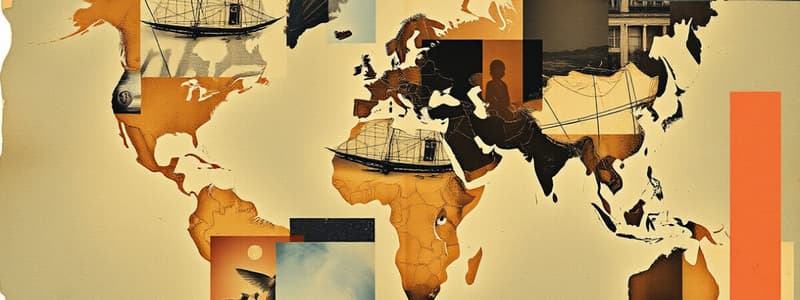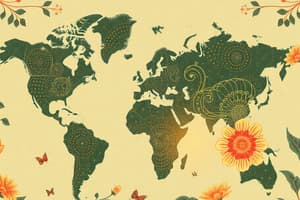Podcast
Questions and Answers
What characterizes a multinational corporation (MNC)?
What characterizes a multinational corporation (MNC)?
- It relies entirely on licensing agreements.
- It operates solely in its home country.
- It has operations in multiple countries. (correct)
- It only exports products without establishing local offices.
How does a strategic alliance differ from a joint venture?
How does a strategic alliance differ from a joint venture?
- A joint venture must involve three or more partners.
- A joint venture forms a separate legal entity. (correct)
- A strategic alliance cannot involve resource sharing.
- A strategic alliance is solely focused on exporting goods.
In the context of global sourcing, which of the following is true?
In the context of global sourcing, which of the following is true?
- It aims to reduce costs by utilizing the cheapest resources worldwide. (correct)
- Global sourcing is the same as exporting.
- It is limited only to raw materials.
- Global sourcing exclusively involves local labor.
Which statement best describes the nature of an importing operation?
Which statement best describes the nature of an importing operation?
What challenge must U.S. managers often adapt to when operating in foreign countries?
What challenge must U.S. managers often adapt to when operating in foreign countries?
What distinguishes a foreign subsidiary from other forms of international business?
What distinguishes a foreign subsidiary from other forms of international business?
Which economic system is characterized by resources primarily owned by the private sector?
Which economic system is characterized by resources primarily owned by the private sector?
In which scenario would licensing be most advantageous for a corporation?
In which scenario would licensing be most advantageous for a corporation?
What aspect of national culture can significantly impact business practices in a foreign country?
What aspect of national culture can significantly impact business practices in a foreign country?
Which term refers specifically to a partnership where resources and knowledge are shared for product development?
Which term refers specifically to a partnership where resources and knowledge are shared for product development?
What is the primary focus of parochialism in a global context?
What is the primary focus of parochialism in a global context?
Which organization directly succeeded GATT in promoting international trade?
Which organization directly succeeded GATT in promoting international trade?
What perspective does a geocentric view advocate for in international business?
What perspective does a geocentric view advocate for in international business?
Which of the following agreements has been renegotiated and is now called USMCA?
Which of the following agreements has been renegotiated and is now called USMCA?
What is a significant downside of globalization as highlighted by critics?
What is a significant downside of globalization as highlighted by critics?
What does the Win-Win Argument suggest about globalization?
What does the Win-Win Argument suggest about globalization?
Which organization is described as a trading alliance of 10 Southeast Asian nations?
Which organization is described as a trading alliance of 10 Southeast Asian nations?
What economic trend occurred after World War II regarding globalization?
What economic trend occurred after World War II regarding globalization?
Which of the following best describes an ethnocentric perspective?
Which of the following best describes an ethnocentric perspective?
Flashcards are hidden until you start studying
Study Notes
Key Concepts in Globalization and Nationalism
- Globalization: Development of influence or operations across countries, fostering interconnectedness.
- Nationalism: Emphasizes pride in one's country; promotes patriotic ideals and policies.
- Parochialism: Limits understanding by viewing the world solely from one's own perspective, ignoring diversity.
- Ethnocentric: Belief that one's home country has the best work practices and cultural values.
- Polycentric: View that local managers understand the best practices within the host country.
- Geocentric: World-oriented approach that values and implements best practices globally.
Historical Context of Globalization
- Post-World War I: Nations adopted protectionist policies.
- Post-World War II: Shift towards globalization emerged.
- Multiple agreements, institutions, and events facilitated the globalization process.
Major Global Trade Institutions
- World Trade Organization (WTO): Comprises 161 countries, governing international trade rules; succeeded the GATT agreement aimed at reducing trade barriers.
- Association of Southeast Asian Nations (ASEAN): A trading alliance of 10 Southeast Asian nations promoting economic cooperation.
- European Union (EU): A union of 28 democratic nations in Europe with a unified economic focus, using the euro as a common currency.
- North American Free Trade Agreement (NAFTA): Eliminated trade barriers between Mexico, Canada, and the U.S.; now renegotiated as the USMCA.
Economic Theories and Critiques
- Win-Win Argument: Suggests that globalization benefits all nations based on comparative advantage; consistent with the philosophy that economic growth benefits everyone.
- Downside of Globalization: Critics argue that it leads to job losses in high labor cost nations, wage stagnation for the middle class, increased wealth inequality, and harm to certain groups by globalization.
Types of Corporations and Strategic Approaches
- Multinational Corporation (MNC): Operates in multiple countries.
- Multidomestic Corporation: Tailored strategies for different countries.
- Global Company: Operates on a global scale with a standardized strategy.
- Global Sourcing: Acquiring materials or labor from any country where costs are lowest.
- Exporting: Producing domestically and selling internationally.
- Importing: Selling products made abroad in the domestic market.
- Licensing: Granting rights to another organization to produce or sell products.
- Franchising: Allowing another organization to use its brand and operating methods.
- Strategic Alliance: Collaborative partnership sharing resources and knowledge for product development.
- Joint Venture: A type of strategic alliance where partners create a separate organization for a specific business purpose.
- Foreign Subsidiary: A separate and independent entity established in a foreign country.
Managerial Challenges in Global Operations
- U.S. managers often face different legal and political environments in foreign countries.
- Staying informed about local laws is crucial to avoid legal pitfalls.
- Political climates can vary significantly, with some being risky or unstable.
Economic Systems
- Free Market Economy: Resources primarily owned and controlled by the private sector, facilitating market-driven decisions.
- Planned Economy: Central government regulates and plans economic decisions.
Impact of National Culture
- National culture encompasses shared values and attitudes influencing behaviors and beliefs specific to a country.
Studying That Suits You
Use AI to generate personalized quizzes and flashcards to suit your learning preferences.




